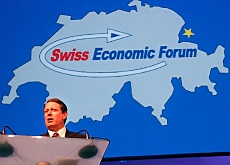
“Hidden majority” tackle economic priorities

Representatives of the "real" Swiss economy are gathered in the lakeside town of Thun to decide their key priorities for the next 12 months.
Keynote speakers at the Swiss Economic Forum event include easyJet founder Stelios Haji-Ioannou and Swiss National Bank director Jean-Pierre Roth.
Mention the words “Switzerland” and “economic forum” and most people will think of the annual WEF meeting in Davos, whose huge international guest-list is outnumbered only by the riot police needed to fend off protestors.
In recent years, though, the Swiss Economic Forum has been quietly developing as an alternative venue, albeit with a more limited focus – the small and medium-sized enterprises (SMEs) that make up the “hidden majority” of the Swiss economy.
CEO and joint organiser Stefan Linder told swissinfo: “We held the first forum in 1999 with just 460 participants. By the third year, we had 1,200 and we have decided to keep it at around that number.
“The aim was quite clear: to create a national platform for the SMEs that represent 90 per cent of the Swiss economy, even if the other ten per cent – particularly the multinationals – have a higher public profile.”
Indeed, the forum is already feeling the consequences of its own success. This year’s two-day event, which began on Thursday, sold out within two weeks.
Starting off right
This year’s meeting, which was opened by Economics Minister Joseph Deiss, takes as its theme: “Setting the right priorities”.
“One of our main goals is to try to identify and anticipate the major issues likely to affect SMEs in the near future,” said Linder. “This year, we had the feeling that, in many instances, the right priorities are not always being set.
“It is not just a question of businesses themselves setting appropriate priorities, as they tend to do so, but also of having appropriate framework conditions, both political and economic.”
In his address, Deiss said it was becoming harder to set and implement priorities because of the constant search for consensus.
He said this Swiss insistence on agreement sometimes held the country back and cited the example of the “toothless cartel law” of 1995 which already needed to be revised.
This year’s forum will consider the example of the retail trade sector – in particular plans by German discounters Aldi and Lidl to enter the Swiss market – with a “Business Case” workshop session focusing on this issue.
A second such workshop will examine the issue of how to deal with the potential crisis affecting the tourist industry in Swiss alpine regions.
Among the keynote speakers are easyJet founder Stelios Haji-Ioannou, Swiss National Bank director Jean-Pierre Roth and Irish health minister Mary Harney.
For those wondering what such illustrious names have to do with Swiss SMEs, Linder points out that large firms and politicians are instrumental in setting framework conditions – as well as often being major customers.
Domestic market
Linder says one major priority for Swiss businessmen and politicians over the next 12 months will almost certainly be moves to increase competition in the domestic market sector.
He points out that the origins of the new domestic market law, due to be debated in this year’s parliamentary summer session, date back over a decade.
“The federal government first approved measures to make the sector more competitive [in particular by making it easier for people offering professional services to compete across cantonal borders] in the early 1990s.
“Since then, though, not much has happened, and Switzerland still does not have a properly functioning domestic market.”
Fresh ideas
While some observers say the forum is primarily a networking event, for Linder a major goal is to provide participants with fresh ideas about how to do business successfully.
Indeed, the marketing and organisational expert himself provides a good example of how to react quickly and in an innovative way to customer requirements.
After participants last year had to queue for up to 40 minutes to register on opening day, organisers overcame the problem this year by sending identity badges by post ahead of the event.
As a result, electronic scanners on site can do the work of conference registration staff – saving participants time and the organisers money.
swissinfo, Chris Lewis
The forum, which began in 1999, is the successor to the Thun Young Business Forum.
The idea was hatched on an alpine farm in the Bernese Oberland region, directly above the Thun conference venue.
It has grown rapidly and now regularly attracts celebrity speakers from business and politics, as well as more than 1,000 (mostly Swiss) participants.

In compliance with the JTI standards
More: SWI swissinfo.ch certified by the Journalism Trust Initiative




























You can find an overview of ongoing debates with our journalists here . Please join us!
If you want to start a conversation about a topic raised in this article or want to report factual errors, email us at english@swissinfo.ch.